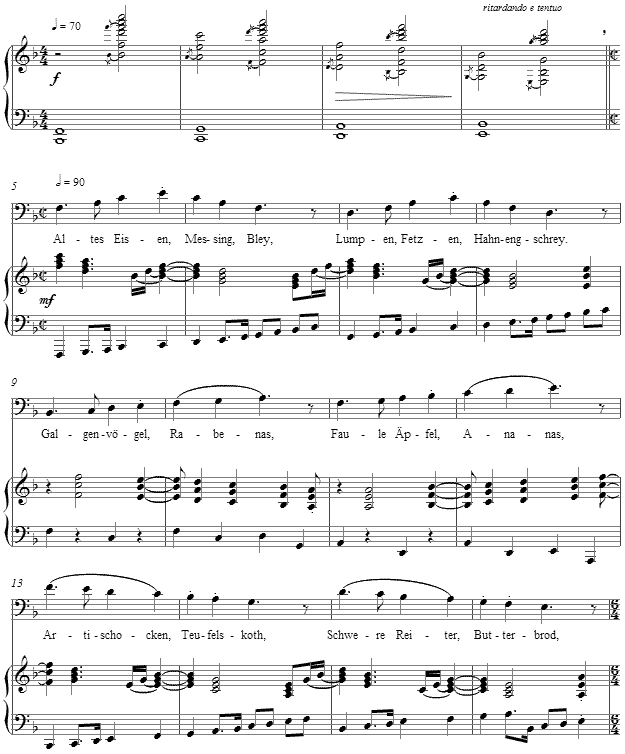Music and Texts of GARY BACHLUND Vocal Music | Piano | Organ | Chamber Music | Orchestral | Articles and Commentary | Poems and Stories | Miscellany | FAQs |
Arie des Orpheus - (2004)
Carl Meisl
for baritone and piano
for baritone Bernhard Spingler
Altes Eisen, Messing, Bley,
Lumpen, Fetzen, Hahnengeschrey.
Galgenvögel, Rabenas,
Faule Äpfel, Ananas,
Artischoken, Teufelskoth,
Schwere Reiter, Butterbrod,
Alte Weiber, Kohlendampf,
Fliegengift und Magenkrampf.
Gliederreißen, Ohrenweh,
Ranzigs Fett und Märzenschnee.
Postillion und Sesseltrager,
Bäckenjodl, Ochsenschlager.
Alte Katzen, schwarze Pudel,
Leberknödel, Lungenstrudel,
Das ist doch ein Quodlibet,
Das gewiß zum Herzen geht.[ 4 pages, 1' 25" ]
Carl Meisl
From Meisl's Orpheus und Euridice (oder So geht es im Olymp zu!) (c. 1820)
"Scrap iron, brass, lead, rags, shreds, cock-crows.
Rogues, wretch, rotten apples, pineapples,
Artichokes, devils' filth, a hard rider, buttered bread,
Old wives, coal smoke, flying poison and stomach cramps.
Aching limbs, earaches, rancid fat and spring snow.
A mail coach driver and arm chair carrier, a baker's yodel and ox beater.
Old cats, a black poodle, liver dumplings, lung strudel,
That is then a quodlibet, which certainly goes to the heart."From Middle Latin for a "disputation," a quodlibet is defined as an academic debate or exercise in argument, especially on a theological question, and it is also defined as a humorously incongruous musical parody, especially of well-known melodies or texts. Who will make sense of this disputation with the gods?
Carl Meisl, alternatively spelled as Karl Meisl, was born 30 June 1775 in Laibach (Ljubljana) and died 8 October 1853 in Vienna. He was an Austrian civil servant und playwright, and - together with Adolf Bäuerle and Josef Alois Gleich - was one of the most important representatives of the Viennese Volkskomödie before Ferdinand Raimund. Meisl was best known for his Parodies of serious Drama and Opera.
This setting of a "parodist" is therefore a silly romp, beginning with triads diatonically descending by thirds over a simple rising scale as a bass line, with the vocal line moving in opposite motion to the right hand of the accompaniment. No great thought or ingenious musical device is behind this setting; it is merely jolly nonsense, and should be performed as such. Then perhaps this "quodlibet" just might go to the heart -- of laughter.
Bernhard Spingler
The score is available as a free PDF download, though any major commercial performance or recording of the work is prohibited without prior arrangement with the composer. Click on the graphic below for this piano-vocal score.


